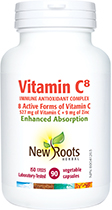Vitamin C
Vitamin C, also known as ascorbic acid, is a water-soluble vitamin and antioxidant in the body. Vitamin C is best known for its effects on immune function as well as for the treatment and prevention of various types of infections, most notably upper respiratory tract infections (URTI) such as cold and flu. A recent study found that supplementation with vitamin C plus probiotics was effective in reducing the rate of URTI by 33% compared with placebo in children attending preschool.[1] The number of days with URTI symptoms was reduced by an average of 21 days compared to placebo. Another study found that supplementation of 1 g (1000 mg) of vitamin C was helpful in reducing URTI among teenage athletes, a population which suffers from increased infections due to the physical stresses of training.[2]
Vitamin C is also useful for other types of infections as well. For instance, one study showed that the addition of vitamin C to standard antibiotic therapy improved the effectiveness of the regimen in treating cervicitis (infection of the cervix) due to chlamydia.[3] The addition of vitamin C to standard therapy with multiple antibiotics for H. pylori infection of the stomach resulted in superior eradication of the bacteria, increasing eradication rates from 48% to 78%.[4] Vitamin C has also been shown to benefit bladder infections. Finally, in a study of patients with sepsis—a serious systemic blood infection—following surgery, vitamin C supplementation was shown to help protect and improve the function of neutrophils, the specialized white blood cells responsible for fighting bacterial infection.[5]
References
- Garaiova, I., et al. “Probiotics and vitamin C for the prevention of respiratory tract infections in children attending preschool: a randomised controlled pilot study.” European Journal of Clinical Nutrition Vol. 69, No. 3 (2015): 373–379.
- Constantini, N.W., et al. “The effect of vitamin C on upper respiratory infections in adolescent swimmers: a randomized trial.” European Journal of Pediatrics Vol. 170, No. 1 (2011): 59–63.
- Khajehei, M., Keshavarz, T., Tabatabaee, H.R. “Randomised double-blind trial of the effect of vitamin C on dyspareunia and vaginal discharge in women receiving doxycycline and triple sulfa for chlamydial cervicitis.” Australian and New Zealand Journal of Obstetrics and Gynaecology Vol. 49, No. 5 (2009): 525–530.
- Zojaji, H., et al. “The efficacy of Helicobacter pylori eradication regimen with and without vitamin C supplementation.” Digestive and Liver Disease Vol. 41, No. 9 (2009): 644–647.
- Ferrón-Celma, I., et al. “Effect of vitamin C administration on neutrophil apoptosis in septic patients after abdominal surgery.” Journal of Surgical Research Vol. 153, No. 2 (2009): 224–30.
Philip Rouchotas, MSc, ND
Well-known in the community as a naturopathic doctor, associate
professor, and editor-in-chief of Integrated Healthcare Practitioners.
 Heidi Fritz, MA, ND
Heidi Fritz, MA, ND
A practicing naturopathic doctor since 2007, her areas of focus include
women's health, children's health, chronic pain, and more.

 Stores
Stores





